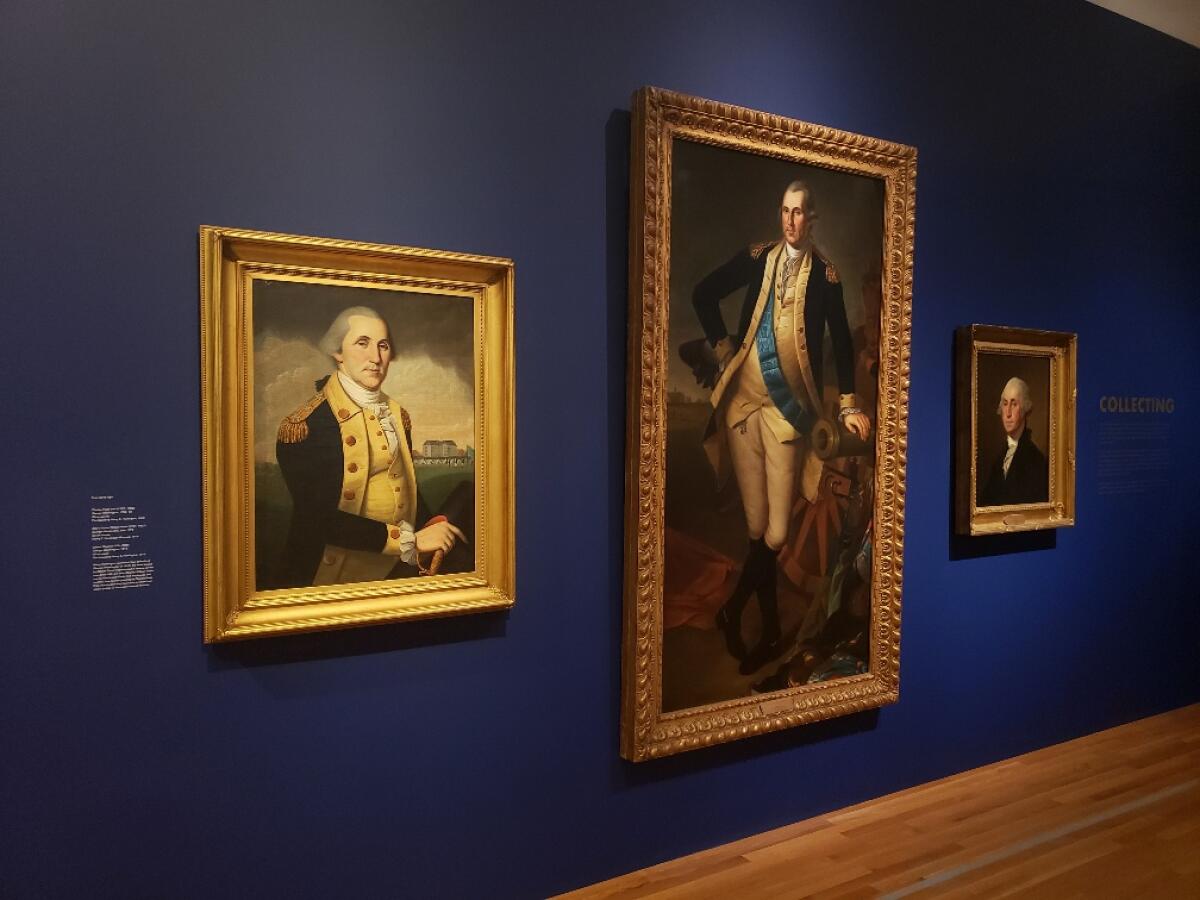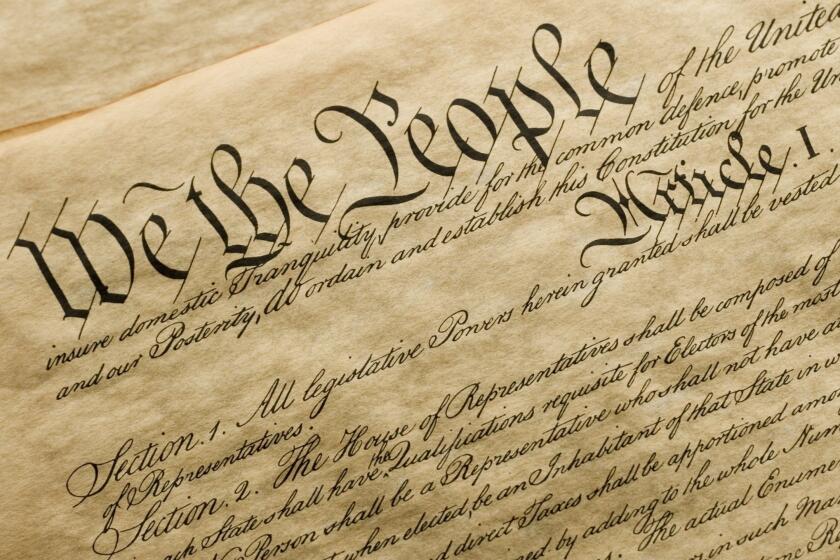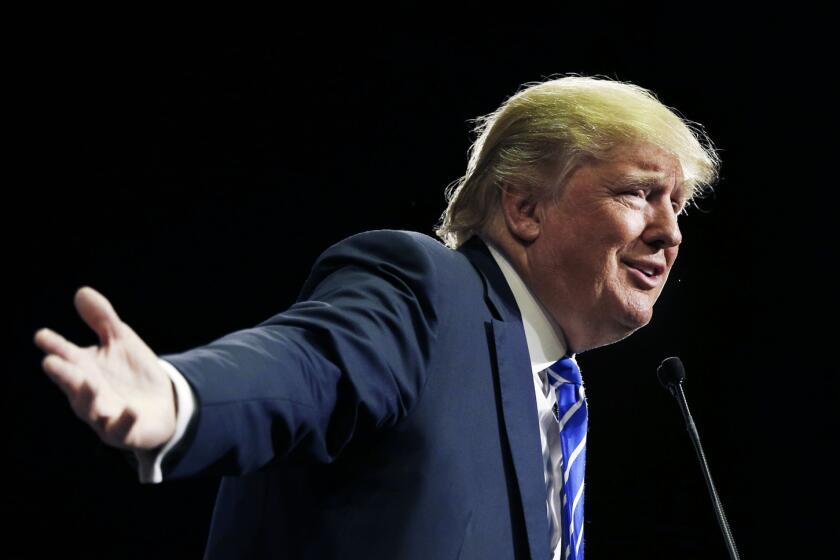Op-Ed: Hear what the founders are saying

I’ve been hearing voices from the past, more specifically the founding era. Obviously, all the founders are busy being dead, and the voices I hear are my own creation, rooted in my reading of the treasure trove of letters and documents left behind by Washington, Jefferson, Adams, Madison and Franklin.
Let me be clear. Any effort to deploy the values of the founding era in the 21st century is a futile exercise, like trying to plant cut flowers. If you were to ask me what Washington would do about Iraq, I have to say that he wouldn’t know where Iraq was. When pressed, I might suggest he’d wonder, “How did we become the British?”
All that said, let me share what I hear the founders’ voices saying in our own deeply divided moment in American history.
First, Thomas Jefferson. He wants us to know that he would wear a mask when a pandemic raged. His bottomless belief in what he called “self-government” presumed that each individual would voluntarily internalize the collective interest of society. So mandatory enforcement by government would be unnecessary. If history proves him a utopian dreamer on this score, he is comfortable with that label for eternity.
James Madison was right. The electoral college is a shoddy piece of work that keeps coming back to haunt us.
Second, James Madison expresses astonishment that, after more than two centuries, we have not done a major overhaul of the Constitution. He is actually stunned that we still have the electoral college, which he always regarded as a political platypus or, as he put it, “a covenant with incoherence.” Madison also surprises me with his harangues against the filibuster, specifically the cloture doctrine, which he denounces as unconstitutional because all votes in the Senate, unless specified, are presumed to be majority votes.
John Adams devotes most of his remarks to complaining that there is no Adams monument on the Mall or in the Tidal Basin. (One can hear his wife Abigail in the background whispering, “Down vanity.”) In the same vein, he suggests the creation of a Mount Rushmore for demagogues, proposing Aaron Burr from his generation and Donald Trump from ours. His remarks feature long quotations from Cicero and Tacitus about the vulnerability of democracies to fake prophets.
Benjamin Franklin has refused to comment on any political issue, explaining that he is the grandfather among the founding fathers, whose senior status in heaven grants him immunity to all interviews. He is, however, prepared to break his silence as the premier American scientist of his day, but even then, only with a written question: “My fellow Americans, what are you thinking?” One can only speculate that he refers to climate change.
Finally, the foundingest father of them all maintains a stoic silence. An angel, presumably serving as Washington’s aide, hands out fliers. “His Excellency is always with you,” they read, “on the dollar bill in your wallet, and on the quarter in your pocket.” Given our Trumpian troubles, I had expected to hear something more relevant from the president who walked away from power, the man who would not be king, the anti-Trump. Instead, Washington comes across as a frozen, distant figure, our American man-in-the-moon. Despite those fliers about his abiding presence, he is Delphic, and his silence communicates, “You are on your own.”
President Trump’s final grade will be in the hands of scholars. It doesn’t look good.
But ending with silence seems rather lame. And listening to a woman’s voice, especially a voice as strong as Abigail Adams’ seems rather right. In 1776, she reminded John to “remember the ladies.” The voice I hear now expresses surprise that, despite conspicuous progress on the gender front, no woman has yet been elected president of the United States. This in contrast with women prime ministers in Germany, Britain and Israel.
Abigail argues — the thought had never occurred to me — that women candidates in a parliamentary system can win election when their party wins a majority of the votes. In the United States, they themselves must prevail in the electoral college, an insurmountable task as long as the vestiges of patriarchy survive in the country’s corners. If John worries that democracy makes demagogues possible and even likely, Abigail worries that democracy allows sexism to survive intact in the fringes of the citizenry. This is one self-evident truth that Jefferson neglected to mention.
Pulitzer Prize-winning historian Joseph J. Ellis is the author of 11 books. The latest is “The Cause: The American Revolution and its Discontents 1773-1783.”
More to Read
A cure for the common opinion
Get thought-provoking perspectives with our weekly newsletter.
You may occasionally receive promotional content from the Los Angeles Times.












